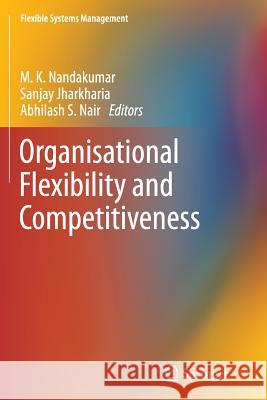Organisational Flexibility and Competitiveness » książka



Organisational Flexibility and Competitiveness
ISBN-13: 9788132229278 / Angielski / Miękka / 2016 / 359 str.
Organisational Flexibility and Competitiveness
ISBN-13: 9788132229278 / Angielski / Miękka / 2016 / 359 str.
(netto: 577,76 VAT: 5%)
Najniższa cena z 30 dni: 578,30
ok. 16-18 dni roboczych.
Darmowa dostawa!
The proposed book is intended to provide a conceptual framework of `Organisational Flexibility and Competitiveness' supported by research studies in various types of flexibilities exhibited by an organisation.
Strategic Flexibility and Competitiveness.- Adapt: A Critical Pillar of Strategy Execution Process.- Flexibility and Sustainability of Mentorship Model for Entrepreneurship Development: An Exploratory Study.- Strategic Flexibility, Information System Flexibility and Enterprise Performance Management.- A Value Optimising Structure in Virtual Enterprises for Manufacturing Systems.- Competitiveness of Key Segment in Solar Photovoltaic Industry in India: An Exploratory Study.- New Perspectives for Industrial Competitiveness: Exploring the Role of IITs.- Organizational and Human Resources Flexibility.- Knowledge Management Process in Organizations and its Linkages with Flexibility: A Caselets Based Inductive Study.- Do Gender, Position & Type of Organization Shape Human Resource Flexibility?.- The Flip Side of Flexibility in Organisations.- Leadership and Effective Integration of Information and Communication Technology for the Age of Restructuring.- Information Systems and Flexibility.- Factors affecting the User Acceptance of ERP and the Impact on the individuals: A Conceptual Model.- Information Systems Flexibility for Green Technologies.- Assessment of Electronic-based Integrated Marketing Communication for Rural North India.- Improving Competitiveness of IT companies by Leveraging Flexibility.- Financial Flexibility and Risk Management.- Real Option Valuation for Mumbai Metro Rail Project: Evaluating Financial Flexibility for Reliance Infra.- Impact of Takeover Code 2011 on M&A Scenario in India: A Study of Share Buyback as a Takeover Defense.-Operations and Supply Chain Flexibility.- Measurement of Flexibility and its Benchmarking Using Data Envelopment Analysis in Supply Chains.- Development of Framework for Analyzing Flexibility in Supply Chain.- Improving Flexibility In Autonomous Cooperating Food Chains.- Dynamic Capabilities through Autonomous Cooperation in International Supply Networks.- Genetic Algorithm Model for Multi product Flexible Supply Chain Inventory Optimization involving Lead Time.-High Impact Scales in Marketing: A mathematical equation for evaluating the impact of popular scales.
Dr. M.K. Nandakumar is the Chairman of International Exchange Programme at the Indian Institute of Management Kozhikode (IIMK), Kerala, India. He is also the Chairman of Strategic Management Area at IIMK. He obtained his PhD from Middlesex University, London. Under his chairmanship the international exchange programme at IIMK has developed very rapidly. He teaches a number of courses at the MBA and Doctoral levels and also for the Executive Education Programmes. Dr. Nandakumar has successfully coordinated the Association of MBAs (AMBA) accreditation project at IIMK. He has worked as Lecturer at both Middlesex University Business School and East London University Business School. He has also worked as Marketing Manager and Area Manager in reputable organizations. He has published a few papers in leading academic journals and presented a number of papers for major international conferences. Dr. Nandakumar’s paper published in Management Decision has been chosen as a Highly Commended Award Winner at the Literati Network Awards for Excellence 2011. He has co-chaired two international conferences namely Eleventh Global Conference on Flexible Systems Management (IIMK - GLOGIFT 11) and the International Conference on Global Strategies for an Emergent India. He is a guest editor of an issue of International Studies of Management and Organization.
Dr. Sanjay Jharkharia is Professor of Operations Management at the Indian Institute of Management Kozhikode, Kerala, India and holds PhD. from Indian Institute of Technology Delhi, New Delhi, India. He has published research papers in several journals including Omega: International Journal of Management Science, International Journal of Operations and Production Management and Supply Chain Management: An International Journal. His current research interests include Multi-criteria decision making, operations strategy and cold supply chain.
Dr. Abhilash Nair is an Assistant Professor in the Finance, Accounting and Control Area at the Indian Institute of Management Kozhikode, Kerala, India. He completed his doctoral studies at the Department of Humanities and Social Sciences, Indian Institute of Technology Bombay, Mumbai, India. During his doctoral work, he was a Visiting Scholar at the Haas School of Business, University of California at Berkeley as a Fulbright Junior Research Fellow. He has published in refereed Indian and International journals and has presented research papers at several Indian and International conferences. Two of his conference papers have received the best paper awards at the respective conferences. One at the Sixth Annual Capital Market Conference organized by Indian Institute of Capital Markets, Mumbai and another at the Second International conference on Globalisation: Opportunities and Challenges organized by Indian Business School, Ahmedabad. Moreover, on policy related issues he contributes to Business periodicals such Economic Times and Business World. His area of research interest is Financial Economics in general and Asset Pricing Models in particular. Currently, he is working on issues related to valuation of human capital and application of real options to price take out financing contracts. Recently, he has published a paper in the International Research Journal of Finance and Economics and another paper in Applied Financial Economics, a Taylor and Francis journal.
The volume is intended to provide a conceptual framework of ‘Organisational Flexibility and Competitiveness’ supported by research studies in various types of flexibilities exhibited by an organisation. The need for enterprise flexibility in an era of rapidly advancing technology, increasing competition, and globalization, is apparent. Flexibility can be thought of as an ability of the enterprise to quickly and efficiently respond to market changes and to bring new products and services quickly to the market place. Beyond this definition, a truly flexible enterprise should proactively change the market through its ability to create truly new and innovative products and services. The book applies the concept of flexibility to various functional areas: strategy and competitiveness, organization and HR management, information systems, finance and risk management, operations and supply chain management.
1997-2026 DolnySlask.com Agencja Internetowa
KrainaKsiazek.PL - Księgarnia Internetowa









